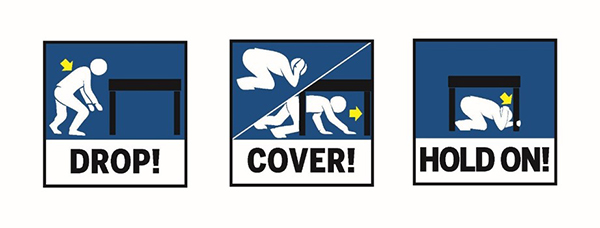
What to expect in an earthquake in Vermont?
Expect the ground to shake, your building may sway or shudder, you may hear a rumble, things may fall from shelves or dishes may break. You may experience foreshocks and aftershocks, so expect more than a single event. Although most earthquakes in Vermont are mild, some models predict more serious impacts in northwest Vermont. Hazard maps show areas of greater concern in Vermont. The hazard depends on the magnitudes and locations of likely earthquakes, how often they occur, and the properties of the rocks and sediments that earthquake waves travel through.
What to do during an earthquake?
If you are inside a building: Stay where you are until the shaking stops and DROP, COVER AND HOLD ON! Do not run outside. Do not get in a doorway or near glass.
People who use wheelchairs or other mobility devices should: lock their wheels, remain seated until the shaking stops, use a pillow or arms to protect their your head.
If in bed, stay there and cover your head.
If outside: Move away from buildings, streetlights, and utility wires. In a city, you may need to go inside to avoid falling debris. Then…DROP, COVER and HOLD ON
If you are in a car: stop and stay inside. Stay away from bridges and utility lines. Afterwards, avoid bridges, ramps and roads which may have been damaged.
When the shaking stops: If there is a clear path to safety, leave the building and go to an open space away from damaged areas. If you are trapped, do not move about or kick up dust. If you have a cell phone, call or text for help. Tap on a pipe or wall or use a whistle, so that rescuers can locate you. Be prepared to “Drop, Cover, and Hold on” in the likely event of aftershocks.
Practice Drop, Cover and Hold On in the annual earthquake drill, Shake Out. Shake Out is held each fall and is an opportunity to register your group and practice for a real event. Even though earthquakes are not common in Vermont, it is wise to know what to do and be prepared no matter where you are.
Preparedness Links:
FEMA's Earthquake Safety Check List
Ready.gov
